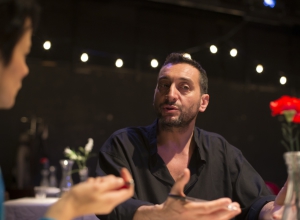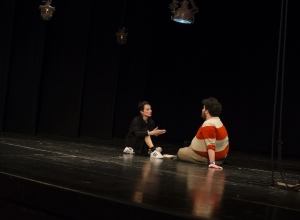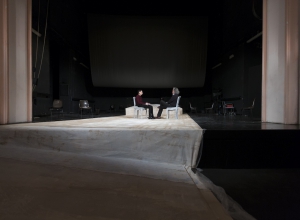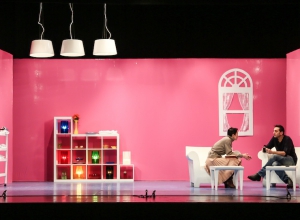#DEFINE THEATRE BEHIND THE SCENES
La poesia, malinconica, di un mondo che sta svanendo, lentamente, inghiottito da un reale sempre più dinamico, frettoloso, fatto di tecnologia più che di parole che fluiscono, lente. Il teatro. Questione di ritmi, che non corrispondono più. Il teatro, il Litta di Milano, visto e vissuto per oltre vent’anni da una donna che sul palco non ha mai avuto l’ambizione di salire perché “Quella del teatro rimane per me ancor oggi una fascinazione umana, più che quella del sedermi in sala e farmi trasportare dallo spettacolo. Forse sono troppo pragmatica per riuscire a lasciarmi andare. Mi affascinano le persone e gli incontri che si fanno in un luogo come questo”. Lei è Gaia Calimani, la donna che dietro le quinte vive la magia del teatro, la magia delle persone: uomini prima, attori poi. “La trasformazione avviene, non la vedi. Accade, come per magia. E nell’accadimento io sto lì, a intercettare le fragilità umane perché chi lavora in un ambiente come questo è più fragile di altri o meglio le fragilità sono più esposte. Le intercetto e le veicolo, devo gestirle, perché a volte sono degli intoppi forti. Vanno raccolte e accolte. Devo tenere insieme i pezzi, capisci? Dare l’impressione di esserci anche quando in realtà non è facile esserci”. Responsabile dell’area Relazioni Esterne ed Eventi del Litta, Gaia approda al teatro appena ventenne “per le casualità della vita, i disegni che vanno oltre a noi” mi racconta, dopo aver frequentato l’Accademia di Comunicazione ed essersi trovata immersa nella realtà sterile delle agenzie pubblicitarie che troppo inaridivano una donna tanto consapevole delle sue spiccate doti organizzative quanto della sua autentica sensibilità. Una sera per caso, un incontro per caso, quello con l’allora Presidente del teatro Litta e l’inizio di una collaborazione che ha preso inaspettatamente forma solida lungo le pieghe del tempo. “Ma io non sapevo nulla di teatro, ci ero stata forse cinque volte nella mia vita, quindi per me era come un mondo a parte, che non mi apparteneva. Ed ho fatto fatica, lo dico, ad accettarlo questo mondo e a farmi accettare. Poi sono passati ventidue anni. In un teatro, sempre lo stesso, che è limite e ricchezza al contempo perché poi queste realtà sono dei micro cosmi uno diverso dall’altro, costruiti sulle persone e sulle dinamiche relazionali, spesso famigliari. Sono le persone che fanno da collante in una struttura come il teatro”. La precarietà di questi anni di crisi pare inghiottire le parole al pari delle risorse finanziarie, senza soluzione di continuità. Se da un lato è difficilissimo continuare a portare il pubblico a teatro “Il tempo di andare a teatro la gente ti risponde che non lo ha. Ti dice che il teatro è difficile, che non lo capisce” dall’altro, continua Gaia, “Vent’ anni fa era molto più facile fare teatro, allestire uno spettacolo, far lavorare le persone. C’erano più soldi! Anche se noi abbiamo sempre fatto fatica a stare in piedi, ad aprire il mattino, a pagare gli stipendi, a fare gli spettacoli. E adesso, dopo tanti anni di lavoro, mi trovo a gestire i clienti degli eventi e il sabato e la domenica a lavare e stirare i costumi per gli attori perché non possiamo permetterci una sarta fissa. Ma la conseguenza di questa precarietà economica, oltre ad una grandissima fatica, è che il teatro davvero lo fai con niente. La magia del teatro la puoi ricreare con due persone che parlano, tutto il resto lo fanno la capacità umana e la creatività”. In un’epoca poco propensa al silenzio e all’ascolto, che ruota ossessivamente intorno ad un bisogno di visibilità del tutto fuori contesto, fuori contenuto, quello di senso, anche il teatro pare diventare mezzo per assolvere a un fine, mezzo teso ad uno scopo, lo scopo del protagonismo individuale. “Io faccio teatro, non io fruisco del teatro” sentenzia Gaia, “Capisci la differenza? Vuol dire vedere il teatro come fase di passaggio per altre cose, come la televisione, il cinema ecc.” Il Teatro Litta fa uno sforzo considerevole per cercare di avvicinare il palcoscenico agli spettatori, vasta è la scelta dei corsi di recitazione che offre, diverse le iniziative quali gli incontri con gli attori, i registi, le visite guidate, i percorsi animati all’interno del teatro per i bambini della scuola materna. “Eppure io non sono ottimista” mi dice Gaia. “Mi illudo che tutto questo possa servire, ma intimamente credo che il teatro tenderà sempre più ad essere uno spazio d’elite, un cerchio stretto, sempre più stretto, fatto di pochi”. Con questa amara considerazione, che per altro condivido, si spengono le luci in sala. Gaia esce di scena inconsapevole di aver recitato su di un palcoscenico, forse per la prima volta, il monologo della vita. Protagonista assoluta di un copione che tratteggia un tempo di solitudine e disagio. Un’epoca aspra nei modi e asciutta nelle parole. Io ho solo ascoltato, e rubato tutta la ricchezza dello spettacolo. L’ho fatta mia e mi tornerà buona nei giorni a venire. Perché a questo serve l’arte, a questo serve il teatro. Ancora. E soprattutto oggi. Mentre osservo il suo andare, pragmatico come dice lei, penso non ci saranno altre repliche. E resta solo, di fondo, un lieve rumore di pioggia.
Si ringrazia per la gentile intervista Gaia Calimani, Responsabile Relazione Esterne e Eventi Teatro Litta Milano – www.teatrolitta.it, gaiacalimani@teatrolitta.it
Video di Pasquale Russo
Traduzione di Chris Alborghetti
THE DUMMY MEETS GAIA CALIMANI #DEFINE THEATRE BEHIND THE SCENES
A melancholy piece of poetry about a world that is slowly fading away and being swallowed by reality which is more and more dynamic, rushed, hectic, and definitely more technological rather than poetic. It’s a matter of rhythms, but we can keep up neither with the rhythm of the natural world nor with the biological one anymore and consequently the theatre cannot either. Litta Theatre in Milan, seen and witnessed by a woman who for over twenty years, has experienced it first-hand without nevertheless, feeling the need to go on the stage. As she puts it “Theatre to me, is still today a human fascination, more than being in the venue and getting carried away by the show. Maybe I’m too pragmatic to let myself go. I’m fascinated by the people as well as the encounters you have in here.” This is Gaia Calimani, the lady that behind the scenes feels, witnesses and experiences the magic of the theatre and actors, who nevertheless are first and foremost people, then actors. “The transformation occurs as if by magic, you don’t notice it, but it does occur and when it happens I’m always there, ready to intercept human fragilities, since who works in this environment is more fragile than other people, or rather is more subject to fragilities if you know what I mean. So I intercept and handle them, because at times they are major stumbling blocks. I have to make my presence felt, or at least give the impression that I’m there, even when it’s tough to be there.” Gaia who today, is in charge of Litta Theatre external relations and events department, starts to work here when she is 20. “I got this job completely by chance, you know one of these things that unexpectedly happen in one’s life” she tells me. She gets the job after studying at the Communication Academy in Milan and working in the field of advertising agencies, that nevertheless does not do justice to her knowledge, competence, organisational skills and last but not least sensitivity. One night, by chance she stumbles upon with the then Litta Theatre President and starts to work in collaboration with the theatre. This collaboration strengthens over time and still goes on today. “I didn’t know anything at all about theatre, I had been to the theatre about five times in my entire life, therefore I was new to the game. I must admit that I struggled to accept this world and to be accepted by it, but twenty-two years have gone by in the same theatre, which means great enrichment but also limits. Because you know, this environment, theatres, connote little worlds all different form one another since they are built on people and the mechanics of relationships, that often are the familial ones. People are the glue that holds the theatre together.” The precariousness that people go through these years of recession seems to swallow not only words, the language on stage is getting poorer and poorer, but also the financial resources. This unfortunately does not ensure continuity over time. If on the one hand, nowadays in Italy, it is incredibly difficult to bring people to the theatre “people say they don’t have time to go to the theatre anymore, and on top of that they argue that plays are difficult and consequently they don’t get them” on the other hand, she continues, “twenty years ago it was much easier to make theatre, set up a show and give people a job. There was more cash around! We’ve always struggled to survive though. This means to open the theatre in the morning, to pay wages and to perform. And now, after so many years of hard work, I have ended up dealing with clients and events at weekends. On top of that I have to wash and iron the actors’ costumes as we cannot afford to pay somebody to do it and a costume designer. Nevertheless, the economic precariousness, on the one hand it makes you work harder and harder, but on the other it compels us to make do with the very little we have at our disposal. The magic of making theatre is that you don’t need much really. All you need are two people talking, even one during monologues, creativity, human capabilities and skills to create the magical theatre atmosphere. ”These days people are unwilling to listen as much as to be reduced to silence, all that matters is visibility, so people feel the urge to be visible somehow. Because of that, most of them convey to the outside world a distorted image of their real self and in this way they deconstruct their identity. Likewise, theatre appears to have become a means to an end, I mean it needs visibility too, it’s a sort of attention-seeking kid, it wants the starring role, do you get me? “I make theatre, I don’t enjoy it” Gaia states, “Do you understand the difference? It means I see the theatre as a transitional period before doing other things such as have a job in television or in the cinema, or something else.” Litta Theatre does is best to get the stage closer to the audience. It offers a variety of acting and drama courses for instance, many events such as gatherings with actors and producers, guided tours and animated tours for kids who attend nursery school. “And yet I’m not optimistic” Gaya says. “I’m just deluding myself if I think that all we do would be enough to get people closer to theatre. Deep down, I believe that in years to come, theatre will be more and more for the inner circle, hence for the elite.” Gaia added embittered. I totally agree with Gaia and share her feeling of resentment considering what sort of situation theatre, in Italy at least, is going through. It must be a bitter pill for her to swallow. All right, folks, that’s pretty much it. House lights go down and Gaia goes off the stage unaware of having been reciting, maybe for the first time, a monologue, that of life. Gaia is the main character in a script about times of loneliness, uneasiness and discomfort. I have just listened to her and enjoyed the great richness of theatre even in a time which is cold, unfriendly, bad mannered and taciturn at the same time. This has been another great learning experience that will come in handy in the future also because there will not be another monologue since this was pure improvisation. That’s what art is for, and theatre is one of the means through which art expresses itself, especially today. When the interview is over I watch Gaia walking in a pragmatic way and I think to myself that she will perform never again. All there is left in the background is the sound of soft rain.
I would like to offer my special thanks and deep gratitude to Gaia Calimani in charge of Litta Theatre External Relations and Events department – www.teatrolitta.it, gaiacalimani@teatrolitta.it
Video by Pasquale Russo
Translation by Chris Alborghetti








